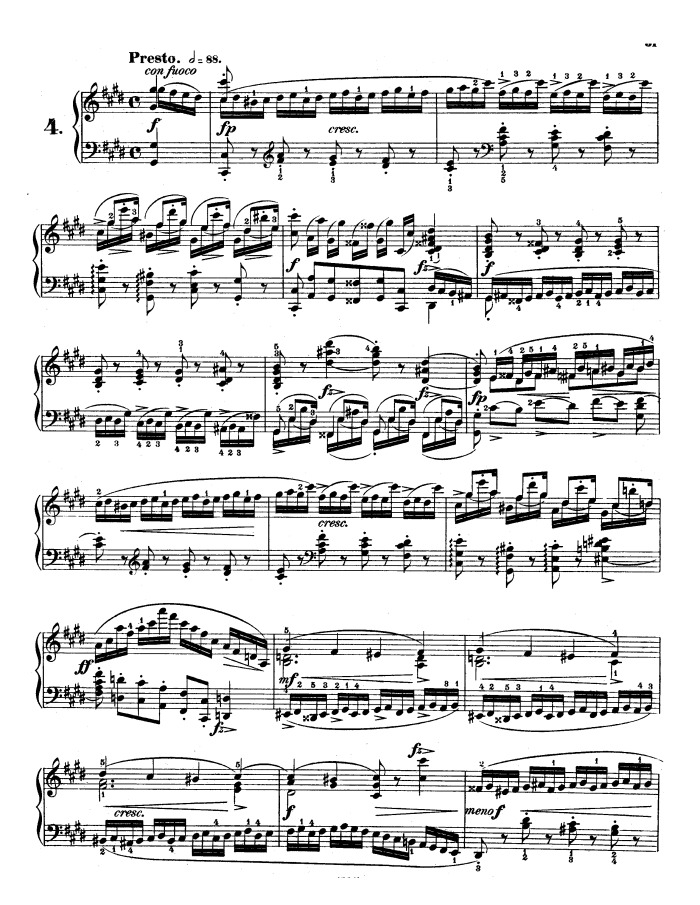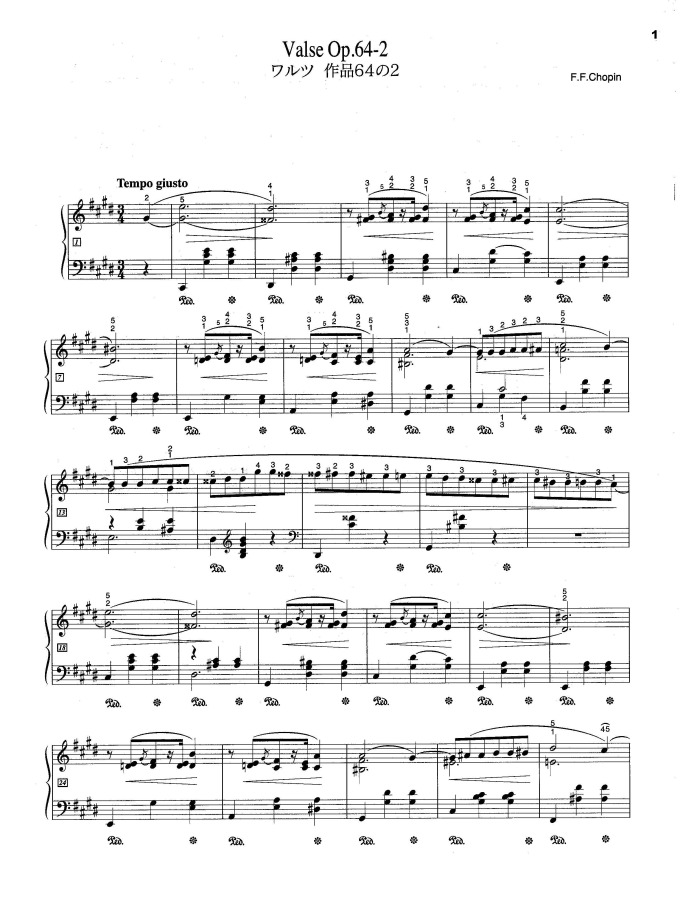| Practice & Performance Tips: |
| As in any piece by Chopin, focus on a cantabile playing and make use of the tempo rubato. Many of Chopin’s waltzes are in an ABA form - they have 3 sections, which many times are punctuated by repeat signs. Find these sections and add capital letters (A) and (B) at the beginning of each section. Then use the directions listed below to practice each section. 1 – Practice the left hand only first. a) Play the downbeats only (bass notes) going from one measure to another. Note the pattern outlined by this bass line and memorize it, speaking the note names as you play. b) Likewise, play the second beat only (chords) going from one measure to the next. Note the pattern outlined by these chords and note the voice leading. Can you play the chords lightly, with firm fingers and a supple wrist? 2 – Practice the right hand only. Following the phrasing correctly gives continuity to your playing. Note the slurs - Chopin was very specific with markings - and make sure that the notes under these slurs are played legato. Do not forget to add shape to your lines and to breathe between phrases. If you play the ornaments lightly, your lines will sound smoother.... Sign up for a Gold membership to read the practice tips. |
Mark, last night I had my daughter listen to this piece, and then listen to a version on a commercial CD of Chopin Waltzes. We both agree that yours has so much more feeling.

Frédéric Chopin’s waltzes are pieces of moderate length adhering to the traditional 3/4 waltz time, but are remarkably different from the earlier Viennese waltzes in that they were not designed for dancing but for concert performance. Some of them are accessible by pianists of moderate capabilities, but the more difficult of them require an advanced technique. Carl Maria von Weber's Invitation to the Dance was an early model for Chopin's waltzes.
Chopin started writing waltzes in 1824, when he was fourteen, and continued until the year of his death, 1849.
Probably the most famous are the Minute Waltz in D-flat major and the C-sharp minor waltz of 1847, two of the last set of waltzes Chopin published before his death (Op. 64).

Background[edit]
There are thirty-six compositions that are of interest to students of the Chopin waltzes.
Chopin published eight waltzes in his lifetime. A further five were published with posthumous opus numbers in the decade following his death, and since then a further seven have been published, without opus numbers. Of these, two are considered doubtful. This brings the total to eighteen canonic waltzes, although often these are not numbered past the first fourteen.
The eighteen waltzes include a piece that was untitled; it is in 3/4 time with the tempo indication Sostenuto, and it has some of the characteristics of a waltz, so it is often (but not universally) catalogued with the waltzes. In addition, the last variation of his Variations on a German Air, op. post., is in the form of a waltz.
In addition, there remain:
- Extant waltzes in private hands and unavailable to researchers.
- Waltzes believed destroyed.
- Waltzes believed lost.
- Waltzes of which documentary evidence exists but the MSS are not known to be extant.
List of waltzes by or attributed to Chopin[edit]
| Series number | Key | Composed | Published | Opus Number | Brown | Kobylańska | Chominski | Dedication | Notes |
|---|---|---|---|---|---|---|---|---|---|
| 1 | E-flat major | 1831–34 | 1838 (June) | Op. 18 | B.62 | Laura Horsford | Grande valse brillante; used in Les Sylphides | ||
| 2 | A-flat major | 1835 | 1838 | Op. 34/1 | B.94 | Josefine von Thun-Hohenstein | The three waltzes, Op. 34 were also published as Grandes valses brillantes, but this title is usually reserved for the Waltz in E-flat major, Op. 18 | ||
| 3 | A minor | 1834 | 1838 | Op. 34/2 | B.64 | Baroness C. d'Ivry | |||
| 4 | F major | 1838 | 1838 | Op. 34/3 | B.118 | Mlle. A. d'Eichthal | |||
| 5 | A-flat major | 1840 | 1840 | Op. 42 | B.131 | Grande valse; sometimes called the 2/4 waltz since the main melody sounds as if in 2/4 time against a 3/4 bass. | |||
| 6 | D-flat major | 1847 | 1847 | Op. 64/1 | B.164/1 | Countess Delfina Potocka | Valse du petit chien is the title Chopin gave this waltz, which is popularly known as Minute Waltz | ||
| 7 | C-sharp minor | 1847 | 1847 | Op. 64/2 | B.164/2 | Baroness Nathaniel de Rothschild (= Charlotte de Rothschild) | Used in Les Sylphides and Secret | ||
| 8 | A-flat major | 1847 | 1847 | Op. 64/3 | B.164/3 | Countess Katarzyna Branicka (or Bronicka) | |||
| 9 | A-flat major | 1835 (24 September) | 1852 | Op. posth. 69/1 | B.95 | Charlotte de Rothschild, Mme Peruzzi and Maria Wodzińska | L'adieu | ||
| 10 | B minor | 1829 | 1852 | Op. posth. 69/2 | B.35 | Wilhelm Kolberg | |||
| 11 | G-flat major | 1832 | 1855 | Op. posth. 70/1 | B.92 | Used in Les Sylphides | |||
| 12 | F minor/A-flat major | 1841 (June) | 1855 | Op. posth. 70/2 | B.138 | Marie de Krudner, Mme. Oury, Élise Gavard & Countess Esterházy | |||
| 13 | D-flat major | 1829 (3 October) | 1855 | Op. posth. 70/3 | B.40 | ||||
| 14 | E minor | 1829 (? 1830–35) | 1868 | Op. Posth | B.56 | KK IVa/15 | P1/15 | ||
| 15 | E major | 1829–30 | 1871–72 | - | B.44 | KK IVa/12 | P1/12 | ||
| 16 | A-flat major | 1827 | 1902 | - | B.21 | KK IVa/13 | P1/13 | Emilia Elsner[note 1] | [note 2] |
| 17 | E-flat major | 1827 | 1902 | B 46 | KK IVa/14 | P1/14 | Emilia Elsner | [note 3] | |
| 18 | E-flat major | 1840 | 1955 | - | B.133 | KK IVb/10 | Émile Gaillard | Headed 'Sostenuto'; not always classified as a waltz | |
| 19 | A minor | 1847–49 | 1955, 1958 | Op. Posth | B.150 | KK IVb/11 | P2/11 | Unedited edition pub. Paris 1955; ed. Jack Werner 1958 | |
| 20 | F-sharp minor | 1838 (?) | 1932 | - | KK Ib/7 | A1/7 | Not by Chopin; first published in 1861, and in 1986 published under the name Valse mélancolique by Stanislaw Dybowski on the bi-weekly 'Ruch Muzyczny', but in 2012 discovered by Luca Chierici to be a shortened version of a piece by Charles Mayer named Le Régret, op. 332. | ||
| - | C major | 1824 (?) | - | - | KK Vb/8 | Lost | |||
| - | A minor | 1824 | - | - | - | KK Vf | Countess Lubienska | Lost | |
| - | C major | 1826 | - | - | KK Vb/3 | MS destroyed; copy of first line made by Chopin's sister Ludwika is extant | |||
| - | A-flat major | 1827 | - | - | KK Vb/4 | MS destroyed; copy of first line made by Chopin's sister Ludwika is extant | |||
| - | D minor | 1828 | - | - | KK Vb/6 | La Partenza; MS destroyed; copy of first line made by Chopin's sister Ludwika is extant | |||
| - | A minor | 1829 | - | - | Discovered 1937; was in possession of H. Hinterberger of Vienna, but now believed destroyed | ||||
| - | A minor | 1829 (?) | - | - | - | - | Sketches for a brief prelude and main theme | ||
| - | A-flat major | 1829–30 (by 21 December 1830) | - | - | KK Vb/5 | Mentioned in a letter from Chopin to his family, 21 December 1830; MS destroyed; copy of first line made by Chopin's sister Ludwika is extant | |||
| - | E-flat major | 1829–30 | - | - | KK Vb/7 | MS destroyed; copy of first line made by Chopin's sister Ludwika is extant | |||
| - | C major | 1831 | - | - | MS destroyed; copy of first line made by Chopin's sister Ludwika is extant | ||||
| - | ? | 1845 (by) | - | - | - | KK Ve/12 | Mentioned in diary of L. Niedźwiecki | ||
| - | B major | 1848 (12 October) | - | - | B.166 | KK Va/3 | Mrs Erskine | MS in private hands and unavailable | |
| - | B-flat major | 1849 | - | - | Discovered 1952; in possession of Arthur Hedley | ||||
| - | E-flat major | 1829-30 | - | - | KK Vb/7 | Mentioned in letters from Breitkopf to Izabela Barcińska in 1878 | |||
| - | ? | ? | - | - | - | KK Ve/10 | Listed in auction catalogue, Paris, March 1906 | ||
| - | ? | ? | - | - | - | KK Ve/11 | Mentioned in letters from Breitkopf to Izabela Barcińska in 1878 | ||
| - | ? | ? | - | - | - | KK Vf | Several waltzes; lost |
See also[edit]
Chopin Nocturne E Minor Posthumous
Notes[edit]
Chopin Waltz Minor Posthumous Pdf Converter Online
- ^Emilia Elsner kept an album of Chopin's manuscripts, which was destroyed during World War II.[1]:29
- ^First published in 1902, from a manuscript in the possession of the family of Jósef Elsner, by F. Hoesick in Warsaw and Breitkopf & Härtel in Leipzig.[2]:132
- ^This Waltz was published together with the Waltz in A-flat Major (see above, No 16).[3]:133
Chopin Nocturne C Sharp Minor Posthumous
References[edit]
Chopin Waltz Minor Posthumous Pdf Converter Free
- ^Orga, Ateş (2015). Fryderyck Franciszek Chopin. Google Books. London, New York, Sydney: Omnibus Press. p. 192. ISBN978-1-78038-444-3.
[Tomasz] Nidecki married Elsner's daughter Emilia (by his second marriage). Chopin contributed seventeen pieces to her autograph album, destroyed in World War II.
- ^Paderewski, Ignacy J., ed. (1949). Fryderyk Chopin Complete Works IX Waltzes. Warsaw: The Fryderyk Chopin Institute.
This Waltz was published for the first time in 1902, from a manuscript in the possession of the family of Jósef Elsner, by F. Hoesick in Warsaw and Breitkopf & Härtel in Leipzig (as a supplement to the collected edition of Chopin's works, Klav. Bibl. No. 23 183 II). The Warsaw Musical Society has in its collections an autograph manuscript of Chopin dedicated to Madame Le Brun (Chopin, His Life and Work, Warsaw 1904, p. 533).
- ^Paderewski, Ignacy J., ed. (1949). Fryderyk Chopin Complete Works IX Waltzes. Warsaw: The Fryderyk Chopin Institute.
This Waltz was published together with the Waltz in A-flat Major (see above, No. 16).